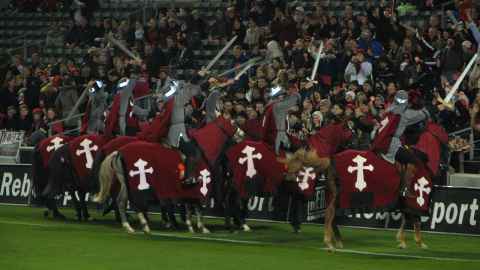Shedding Christchurch’s ‘territorial stigma’
16 May 2019
Opinion: Christchurch needs some positive branding and a re-name for the Crusaders that signals inclusion would help, writes Associate Professor Steve Matthewman.

How many people associate the Canterbury rugby team with the religious wars of medieval Europe? Not many, if any. Although there used to be chain-mailed knights riding the field’s flanks at every home game to remind us.
This perhaps explains why 76 percent of those surveyed in the 1 News poll opposed changing the Crusaders’ name. On the back of this, commentators like Mike Hosking have condemned calls for a name change as “PC gone mad”. I’d like to coach us towards an alternative opinion.
Of course, sports teams’ names should not always be taken literally. As Mike Hosking noted, it’s not as if the Highlanders are marauding killers or the Hurricanes a destructive tropical cyclone. But it’s also true that neither the resident community of Scots nor the meteorological community take offence at these names.
And there are further truths to be reckoned with here. Christchurch is still recovering from thousands of earthquakes. And now it is the site of one of the world’s worst mass shootings. Stated simply, the Crusaders are a winning team in a struggling city. Why not shed a meaningless association with past events half a world away and focus on a positive, inclusive, future-oriented one instead?
Now, like never before, is the time for positive branding. Journalist Steve Braunias wrote: “Christchurch: You say the word or hear the word and it instantly means the place where the shootings happened. It's what the world thinks. It's our Columbine.”
Will Rifkin, an Australian academic, has similarly said that the city will face a challenge ridding itself of its new “territorial stigma”. For anyone concerned about the recovery this is deeply troubling news. The insurance money that fuelled the Canterbury rebuild plateaued in 2014, the dairy boom is slowing down.
In February of this year, Westpac’s chief economist said: “The Canterbury economy is about the weakest in the country.” That same month, leading Canterbury journalist John McCrone wrote: “Christchurch stands shiny and ready, with new buildings, a compact design, quake-proofed infrastructure. But it has to start attracting the people and the jobs – the economic growth – which will complete its recovery, otherwise it will remain a pretty shell.”
The traditionalists might not like change, but change is normal, in rugby as in most other things.
Sociologist Paul Spoonley recently pointed out that two thirds of the country’s estimated population growth will come from migration. Given its ageing local population, ChristchurchNZ Holdings thinks the city needs the best part of 75,000 migrants over the next 15 years to plug the holes in its economy. For that to happen the city will need to be as cosmopolitan and welcoming as it possibly can.
Christchurch has a world-class rugby team and deserves a city to match. Associating the pre-eminent team in the region’s history with inclusion rather than division can only be a good thing. The traditionalists might not like change, but change is normal, in rugby as in most other things. Across time the rules of the game have changed, the style of play has changed, uniforms have changed, and in Canterbury, the venue for games has changed as well. If it is a change for the better, why not change the name too?
Christchurch, and indeed New Zealand’s, response to the attacks has garnered global plaudits. We have achieved the seemingly impossible compared to countries like the United States. Our Prime Minister referred to a white shooter as a terrorist, she committed to immediate gun control, and is now leading the regulatory charge against social media giants.
Why not add something else to that enviable list and do yet another thing that is impossible to achieve in the US: change a contentious team name?
Dr Steve Matthewman is an Associate Professor of Sociology in the Faculty of Arts. His current research project is the three-year Royal Society of New Zealand Marsden-funded work: Power Politics: Electricity and Sustainability in Post-Disaster Ōtautahi (Christchurch), with Hugh Byrd (Unitec) and Christine Kenney (Massey University).
This article reflects the opinion of the author and not necessarily the views of the University of Auckland.
Used with permission from Newsroom Shedding Christchurch’s ‘territorial stigma’ published on 17 May 2019.